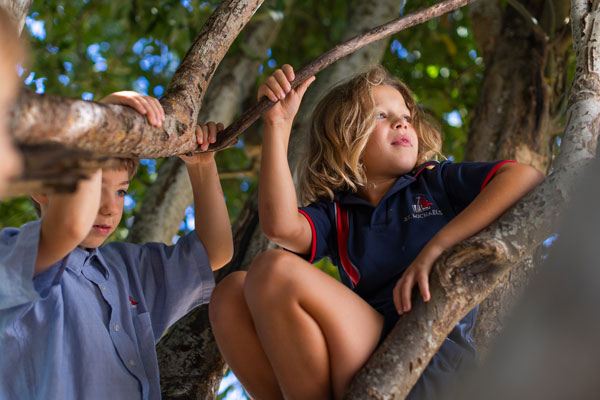Learning
St Michael’s is made up of students and families who come together as a community because they value the education that we provide.
Being part of this community means accepting the many points of difference amongst the beliefs and values of our families, but that we are brought together under the values that we share in our school. To be a great community, we must consciously work hard to be accepting of all, forgiving of all and inclusive of all.
St Michael’s works with parents, services and agencies to create learning communities that are safe, inclusive, conducive to learning and free from harassment and bullying.

Multi-Age Classes
Our school community encompasses 200 students.
Students participate in classes where the class size is capped at 28 students; but more usually sees 20 – 24 students per class. Your child will be in one of the following communities:
Beginning Learning Community Foundation and Year 1
Junior Learning Community Year 2 and 3
Middle Learning Community Year 4 and 5
Senior Learning Community Year 6
Diverse Learning
St Michael’s values inclusion as fundamental to providing effective, Christ-centred quality education. We provide an inclusive and positive environment for all our students and ensure that classroom practices allow all students access to the curriculum on the same basis as their peers.
We use a Response to Intervention Framework for students of all ability levels. Students receive individualised instruction allowing them to experience growth in the general classroom and receive additional support as required.
Teachers
We are fortunate to have well qualified and very experienced teachers and learning support staff at St Michael’s, many have spent over 15 years teaching at our school.
The majority of our teachers attained a Bachelor of Education and some have gone on to attain a Graduate Certificate in Special Education with a focus on autism.
St Michael’s teachers come from diverse backgrounds, our 11 female and 3 male teachers work together to create learning experiences that meet the needs of all our students.
Teacher Professional Learning
St Michael’s teaching staff embrace continual improvement with the School’s Professional Learning Framework that supports ongoing teacher improvement.
Staff participate in professional learning that is provided by the International Baccalaureate and continuously update their expertise in curriculum areas throughout the year.
Our Principal, Terri Taylor
Ms Taylor has extensive educational experience, working in Lutheran schools since 1994.
She is an experienced leader, holding the role Head of Junior School at Living Waters Lutheran College WA and at Unity College, before taking on the Principal’s role at St Michael’s in 2016.
Passionate about Primary Education and providing students with personalised learning opportunities that cater to their needs, Ms Taylor enthusiastically embraces the outdoors as a learning tool and promotes the importance of play in learning.
Born and raised in country SA, Ms Taylor achieved her Diploma of Early Childhood Education at Uni SA, before completing a Graduate Diploma of Theology in Education. She then went on to complete a Masters of Education.
An active member of St Michael’s Church community, she volunteers on their AV team, and sings in a church band.
Guiding Principle
St Michael’s values inclusion as fundamental to providing effective, Christ-centred quality education.
We believe that every child deserves:
- to learn and grow in a safe and responsive school climate
- to experience a unified approach to discipline
- opportunities to develop their social and emotional competence
- access to effective academic instruction
Staff at St Michael’s adhere to these principles:

